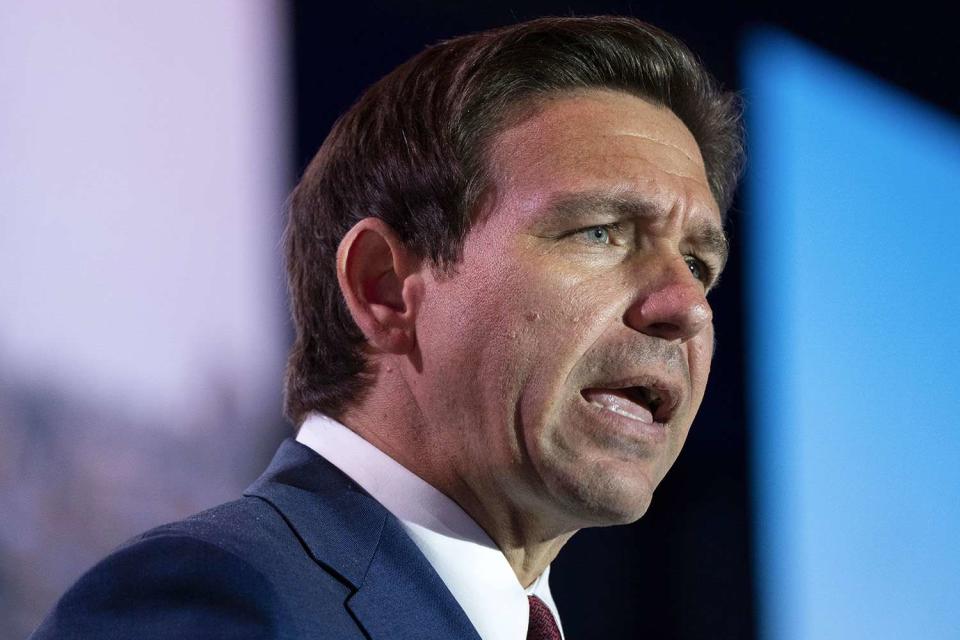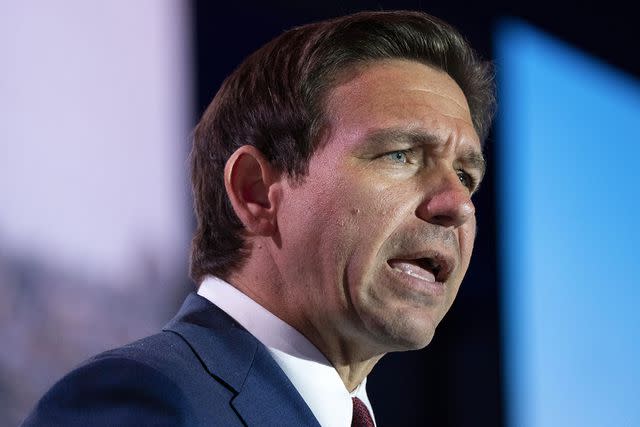Florida Students Now Need Parental Permission to Use Nicknames, 'Alternate' Names Under New Ron DeSantis Rule
- Oops!Something went wrong.Please try again later.
The rule would impact students who prefer using a shorthand nickname and those who prefer a different name altogether, including transgender students

AP Photo/Jacquelyn Martin
Florida Gov. Ron DeSantisFlorida students will now be required to get their parents' consent before using a nickname in schools, a move that critics say targets the LGBTQ+ community and could extend well beyond.
In an email sent Tuesday morning, parents and guardians of Seminole County students were advised that school districts in the state are now "required to develop a form to obtain parental consent to use any deviation or nickname from the child's legal name in school."
"If you would like for your child to be able to use a name aside from their legal given name on any of our campuses, we will ask for you to complete the consent form titled 'Parental Authorization for Deviation from Student's Legal Name Form.'"
Related: The Most Controversial Bills Ron DeSantis Has Signed into Florida Law So Far This Year

AP Photo/Jacquelyn Martin
The email cites rule 61-1.0955(8)(m), which was implemented in July and, according to the Florida Department of Education, is meant "to strengthen the rights of parents and safeguard their child’s educational record to ensure the use of the child’s legal name in school or a parent-approved nickname."
Per Fox35 Orlando, a similar memo went out to parents of Orange County students this week, with more expected to follow.
The rule would impact everyone from students who prefer using a shorthand nickname ("Tom" versus "Thomas," for instance), to those who prefer a different name altogether, including transgender students (who have already been the target of numerous pieces of legislation in Florida in recent months).
But even if a transgender student did get permission from their parent to use a different name, teachers would still not be obligated to use that student's preferred pronouns.

That's due to Florida House Bill 1069, which was approved by Florida Gov. Ron DeSantis and went into effect in July. The controversial bill prohibits school employees from being required to use "certain titles and pronouns." DeSantis has lauded that measure, saying it "protects students from having to declare their pronouns in school," in a press release.
Among its other provisions are that the measure — which has been dubbed "Don't Say Period" by critics — restricts public school instruction on human sexuality, sexually transmitted diseases and related topics to grades 6 through 12 only.
It also allows residents to challenge any book found in a school library or teacher library, which has already opened the door for several book bans in the state. (In Tampa's Hillsborough County, for instance, teachers are even cutting back on teaching Shakespeare due to the stringent rules).

The sweeping new standards are already having a major impact in Florida, where some counties (including Broward, Florida's second-most-populous county that includes Fort Lauderdale and Hollywood) have said they will now no longer be teaching alternatives to abstinence — only abstinence. Broward County has also said, due to the strict new standards, it will limit education about menstruation to students in grades 6 to 12.
In an op-ed penned for Fast Company, a group of activists said the bill restricting school instruction on sex and STDs "will affect younger generations by inciting shame about their bodies, identities, and experiences and ignoring the need for comprehensive education."
The critics add that the measure "contains various provisions that limit student safety, ignores trans and nonbinary identities, bans essential education about bodies and reproductive health, and establishes a system where educational materials can be easily removed from classrooms without fair and proper evaluation."
That measure is one of many endorsed by DeSantis, who is now running for president, that aim to regulate how students and teachers can speak about gender and sexuality in schools (including sex education) and how they can identify themselves.

In 2022, Florida lawmakers passed a controversial bill to block the classroom discussion of certain LGBTQ+ topics in the third grade or younger, or "in a manner that is not age appropriate or developmentally appropriate for students in accordance with state standards." This year, the measure was expanded to cover grades 4 through 12, as well.
The bill, formally titled "Parental Rights in Education" and often referred to as the "Don't Say Gay" law, received widespread, national backlash even before it took effect, with critics saying it could have adverse effects on an already marginalized community.
The original bill ignited a feud between DeSantis and Disney World (Florida's largest private employer and a tourism juggernaut) when the company expressed opposition to the polarizing measure.
In May, DeSantis signed a bill that will eliminate funding for diversity, equity and inclusion programs from public universities and prohibit the teaching of critical race theory in general education courses.
Never miss a story — sign up for PEOPLE's free daily newsletter to stay up-to-date on the best of what PEOPLE has to offer.
More recently, DeSantis has defended new academic standard in Florida that requires middle schools to teach students that enslaved people “developed skills” that “could be applied for their personal benefit.”
Meanwhile, some of DeSantis' most high profile and deep-pocketed donors are abandoning his campaign, or at least threatening to—some citing what they call "extremism."
For more People news, make sure to sign up for our newsletter!
Read the original article on People.

